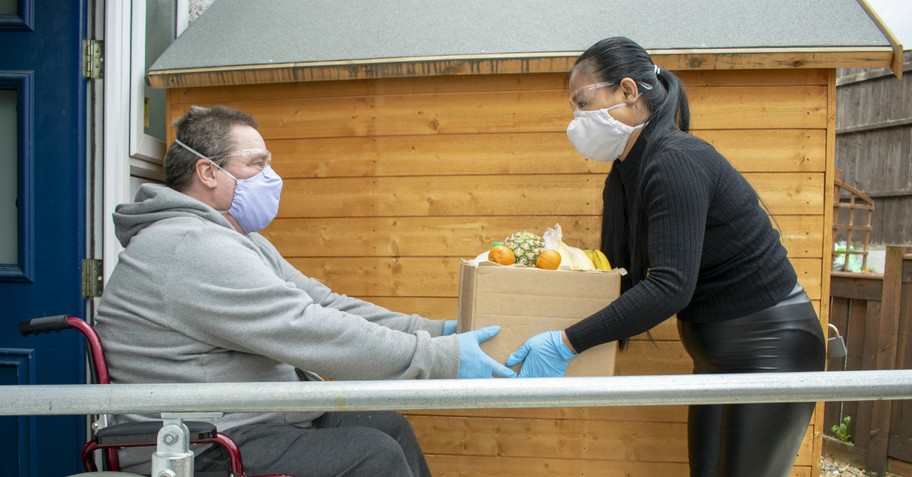What Would the Apostle Paul Say about Wearing Face Masks?

The Bible says nothing about wearing face masks during a pandemic. Searching the scriptures will uncover no reference to the donning of cloth face-coverings during a time of wide-spread infection.
How are Christians today, then, to tackle the issue of wearing face masks?
Given that people have different understandings as to the appropriateness of mask-wearing, how do we go forward? To which scriptures do we turn? Do we turn to the scriptures that detail the freedom of the Christian, or do we turn to passages detailing Christ’s call to love?
Just what is the biblical response to wearing face masks?
While the Bible offers no outright references to this pandemic-specific issue, the Apostle Paul does offer teaching that may be applicable to this situation. In his first letter to the Corinthians, Paul tackles the issue of eating food sacrificed to idols. True, this is not the same as hanging a cloth barrier from your ears, but the dynamics of this first-century issue are quite similar to our issue today.
The Corinthian church faced a situation never experienced before. Some offered that their freedom in Christ meant that eating food sacrificed to idols was okay. And, as we see in our current face mask face-off; others objected.
Faced with no clear-cut scriptural mandate, Paul offers wise counsel—counsel that may be prudent given our contemporary situation. Paul’s response has four main points:
Photo Credit: ©GettyImages/Feverpitched

1. Paul Addresses Basic Truths about Our Holiness and God’s Power
In 1 Corinthians, Paul begins his discussion on food sacrificed to idols by reminding the Corinthian people of the basic truths surrounding idols. “We know that an idol is nothing...there is no God but one.” (1 Cor. 8:4)
Paul situates the issue of idol-sacrificed food firmly within the basic theological understanding of God’s presence, and Christ’s Lordship. He also affirms in 1 Cor. 8:8 that “food does not bring us nearer to God.” The issue of food sacrificed to an idol does not actually affect one’s interactive relationship with the Lord.
In a similar fashion, we can affirm basic truths regarding the wearing of face masks.
The wearing or non-wearing of face masks does not indicate holiness. Nor does the presence of a face mask comment on God’s power to heal. We can affirm, as a basic truth, the power of God to heal and to protect. We affirm that “there is but one Lord, Jesus Christ, through whom all things came and through whom we live.” (1 Cor. 8:6)
Furthermore, we can even recognize that cloth coverings do not guarantee protection from viruses, and indeed the frequent touching of face masks may increase one’s potential toward infection. Just as Paul sets the issue of sacrificed food within the larger tapestry of God’s place in the world, so too we can begin here.
Photo Credit: ©GettyImages/Des Green

2. Paul Speaks to the ‘Weakness’ of Other Believers
Importantly, by using the term weak in 1 Cor. 8:7, Paul does not demean those who were concerned with food sacrificed to idols—he simply gives voice to the reality of people, within the community of faith, who were concerned over the matter. Paul also recognizes that eating food sacrificed to an idol may actually harm someone’s spiritual life. He writes: “Some people are still so accustomed to idols, that when they eat such food they think of it as having been sacrificed.” (1 Cor. 8:7)
For such individuals, to eat food sacrificed to an idol was tantamount to the worship of that idol, and therefore a negation of their worship of Christ as Lord. Paul simply cannot deny that this is the case within the Corinthian community.
When speaking of the wearing of face masks today, we simply cannot deny that there are those, even within the church, who become fearful if surrounded by people who are not wearing a mask. We may disagree with this stance, or even believe this fear is unwarranted. That, however, does not deny the fear felt by others.
Currently, face masks are becoming more common each passing week, and an increasing number of government officials are advocating for the continual wearing of a mask. Given this, we must recognize that some may be, or become, so accustomed to face masks, that when they see people not wearing one, they feel in danger.
Photo Credit: ©GettyImages/Khosrork

3. Paul Asks if Your Actions Are a Stumbling Block
It is here where Paul’s advice really picks up, and where 1 Corinthians 8 becomes instructive for us. Paul’s advice to the church is not simply to call those with a “weakened conscious” to think rightly about the matter. Rather, Paul asks the Corinthian church, and by extension himself, an important question: Are your actions a stumbling block for another?
While he affirms believers’ freedom to eat food sacrificed to idols, Paul advises the believers in 1 Cor. 8:9 to ensure “that the exercise of your freedom does not become a stumbling block to the weak.” Instead of merely appealing to right knowledge, Paul calls for consideration of another’s experience as a way of showing Christian love.
It is this move that Christians are called to make in considering the issue of face masks. The question to consider is: does exercising the right not to wear a mask become a stumbling block to someone? Could someone be unduly harmed by my refusal to wear a mask?
Of course, we aren’t talking about physical harm here (as in the transfer of droplets) we are talking about spiritual harm. Could the lack of a face mask prevent someone from receiving the good news of God in Christ? Could one’s experience of the life-giving community of faith be adversely affected by someone not wearing a mask, just as someone in Corinth was adversely affected by the eating of previously idol-sacrificed food?
For Paul, the answer to this question has to be “Yes.” Indeed, the entire matter of food sacrificed to idols was brought before Paul precisely because individual Christians were being aversely spiritually affected by the practice. There is simply no other logical conclusion. Given this, Paul concludes that the way forward is not found in merely promoting correct knowledge about the issue.
Photo Credit: ©GettyImages/Toa55

4. Paul Encourages Right Love over Right Knowledge
Paul concludes his discussion by picking up on a statement made in 1 Cor. 8:1: “...knowledge puffs up while loves builds up.” Right knowledge can only get you so far. It puffs up the individual because it is only concerned with the individual.
Puffed-up knowledge creates the dynamic of right versus wrong, this way versus that, me versus you. In puffing up the individual, it destroys the community of faith.
Love, however, builds up. Love supports. Love encourages. Love concerns itself with how it is received by another. Love is completely and utterly sacrificial. The word Paul uses here is the Greek word agape. We find this word in all the wonderful scriptural passages about love. You may even have highlighted some of these verses.
“For God so agape-ed the world that he gave his one and only son.” (John 3:16)
“A new command I give to you, that you should agape one another, as I have agape-ed you.” (John 13:34)
“Agape is patient. Agape is kind. It is not self seeking….” (1 Corinthians 13:4)
“The fruit of the spirit is agape, joy peace...” (Galatians 5:22)
Agape describes the divine, sacrificial love of God most uniquely expressed in the cross of Christ. Our experience and expression of agape is rooted in the presence of Christ in our lives. When ancient peoples said of the Christian community “see how they love each other,” they were commenting on the lived-out expression of Christlike agape
The love we are to express as a person of faith is to be of this character. This means it is concerned with the other, and constantly gives to the other. For Paul, the demands of Christlike love are such that he must concern himself with the other person’s life of faith. Thus, in the spirit of love, he declares in 1 Cor. 8:13: “If what I eat causes my brother to fall into sin, I will never eat meat again.”
Even though he himself affirmed that idols are nothing, and therefore eating food sacrificed to a non-entity would be nothing to be concerned about, Paul remains filled with the spirit of love. He sees that the only faithful response to this matter is to limit his own freedom for the sake of other.
This is the only faithful response to the face mask matter at hand, because this is the response of Jesus. Paul says elsewhere that our attitudes in life should be the same as Christ Jesus, “who being in the very nature of God...made himself nothing.” (Phil. 2:6-7)
In Christ, God Emptied Himself for Our Sake
Jesus humbled himself and became obedient to death on a cross, just so we could have the opportunity to experience the most liberating, life-changing, transformative love that God has to offer us. Jesus could have called us to smarten up. He could have appealed to right knowledge, insisting that his blessings were reserved for the like-minded. He didn’t. Jesus exuded love and demonstrated his agape for us in this: while we were yet sinners, Christ gave himself for us.
So, let us not make the matter of wearing a face mask about the perfect execution of right knowledge...whether it be theological or virological.
Rather, let us recognize the call to Christlike love. Let us take up the call of the cross, and willfully empty ourselves for the sake of another. Let us emulate Paul as he emulates Christ. And, if a refusal to wear a mask causes a brother or sister to fall into sin, may we consider wearing them as a way to express agape love, instead.
Recommended for You:
Do We Have Freedom or Responsibility to Wear Face Masks?
The Four Types of Love in Scripture and How to Experience Them Today
Is the Coronavirus Exposing Our Idols?
10 Ways Christians Can Exemplify Faith and Peace during COVID-19
10 Ways to Reach Out in Love during the Coronavirus Outbreak
Photo Credit: ©GettyImages/Taizhan Sakimbayev
Originally published July 22, 2020.







